|
|
|
Sort Order |
|
|
|
Items / Page
|
|
|
|
|
|
|
| Srl | Item |
| 1 |
ID:
153355
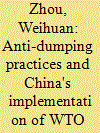

|
|
|
|
|
| Summary/Abstract |
We explore China's behaviour in taking anti-dumping actions, with a focus on those which have been challenged under the WTO dispute settlement mechanism. We argue that the typical motivations behind China's resort to anti-dumping measures include protection, retaliation, industrial development and export promotion. These motivations are likely to carry more weight than China's observance of WTO obligations when deciding whether to impose anti-dumping measures and whether to implement WTO rulings. Brief recommendations are provided to foreign governments and exporters on how to avoid China's anti-dumping actions.
|
|
|
|
|
|
|
|
|
|
|
|
|
|
|
|
| 2 |
ID:
153351
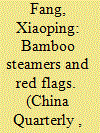

|
|
|
|
|
| Summary/Abstract |
This paper explores how the new Communist government developed a political consciousness of discipline and collegiality among traditional rural midwives in Chinese villages during the 1950s. It argues that selected traditional rural midwives were taught to observe discipline by attending meetings and studying, and to develop collegiality with peers through criticism and self-criticism of their birth attendance techniques and personal characters in short training courses from 1951 onwards. A legitimized midwife identity gradually formed in rural communities, but with it came conflicts and rivalry. By keeping these midwives under institutional surveillance and creating a dynamic and constant moulding process, the new government intended to foster professional and political discipline and collegiality within the group based on a normativized notion of selflessness performed within a changing series of indoctrination schemes that demonstrated continuity and complementarity and which I have described as common, preliminary, institutionalized, and dynamic schemes. This article examines how the state attempted to retrain marginalized and derided midwives with appropriate class backgrounds in order to incorporate them into the modern medical world, then still dominated by doctors and nurses with suspect class backgrounds. Ironically, in creating “socialist new people” to intervene in traditional rural birthing practices and introducing fee-for-service professionalism, the CCP accidentally created a degree of petit-capitalist thinking among women whose traditional mode of work may have been more selfless, thus complicating the process of indoctrinating selfless dedication.
|
|
|
|
|
|
|
|
|
|
|
|
|
|
|
|
| 3 |
ID:
153346


|
|
|
|
|
| Summary/Abstract |
It has been well established that better educated individuals enjoy better health and longevity. In theory, the educational gradients in health could be flattening if diminishing returns to improved average education levels and the influence of earlier population health interventions outweigh the gradient-steepening effects of new medical and health technologies. This paper documents how the gradients are evolving in China, a rapidly developing country, about which little is known on this topic. Based on recent mortality data and nationally representative health surveys, we find large and, in some cases, steepening educational gradients. We also find that the gradients vary by cohort, gender and region. Further, we find that the gradients can only partially be accounted for by economic factors. These patterns highlight the double disadvantage of those with low education, and suggest the importance of policy interventions that foster both aspects of human capital for them.
|
|
|
|
|
|
|
|
|
|
|
|
|
|
|
|
| 4 |
ID:
153353


|
|
|
|
|
| Summary/Abstract |
Hydropower dams are back in the spotlight owing to a shifting preference for low carbon energy generation and their possible contribution to mitigating climate change. At the forefront of the renaissance of large hydropower dams are Chinese companies, as the builders of the world's largest dams at home and abroad, opening up opportunities for low- and middle-income countries. However, large hydropower dams, despite their possible developmental and carbon reduction contributions, are accompanied by huge economic costs, profound negative environmental changes and social impacts. Using fieldwork data from four hydropower projects in Ghana, Nigeria, Cambodia and Malaysia, this paper evaluates the behaviour of Chinese stakeholders engaged in large hydropower projects in Asia and Africa. We do this by first exploring the interests of the different Chinese stakeholders and then by investigating the wider implications of these Chinese dams on the local, national and international contexts. The paper concludes that hydropower dams will continue to play a prominent role in future efforts to increase energy security and reduce energy poverty worldwide, therefore the planning, building and mitigation strategies need to be implemented in a more sustainable way that takes into account national development priorities, the needs of local people and the impacts on natural habitats.
|
|
|
|
|
|
|
|
|
|
|
|
|
|
|
|
| 5 |
ID:
153349


|
|
|
|
|
| Summary/Abstract |
Following a well-established research tradition on court decisions, this study analyses 524 defamation cases in China from 1993 to 2013, explores the media's success possibilities, and investigates the role of party capacity, political influence and the medium effect. Contrary to the existing assertions, we find that the media are not necessarily losing. On average, from 1993 to 2013, the success rate of news media in Chinese defamation courts was 42 per cent, and this rate has been increasing since 2005. We also find that government officials and Party organs had consistent advantages in court, while ordinary plaintiffs, magazines and websites had less success. The medium of the media (i.e. print, broadcast, internet) makes a difference, as do the government policies governing the media. In addition, local protectionism exists, but it is less rampant than expected. These findings compel us to rethink the dynamics among the media, the courts and the state, and their implications on China's institutional resilience.
|
|
|
|
|
|
|
|
|
|
|
|
|
|
|
|
| 6 |
ID:
153348


|
|
|
|
|
| Summary/Abstract |
Since colonial times to the present day, Hong Kong's position as a global financial centre is one of the enduring economic strengths of the territory. This success is often attributed to the distinctive role of the state, coined in the 1970s by the-then financial secretary, Sir Philip Haddon-Cave, as “positive non-interventionism.” The relationship between the market and the state has also been characterized as a form of corporatism, particularly in the financial sector as bankers were able to influence policy. However, closer examination of the behind-the-scenes relations between bankers and the state reveals a much more complex relationship, with the banks seeking protection that the government was not willing to provide. Moreover, the reluctance to regulate financial markets resulted in piecemeal interventions and weak implementation that undermined the stability of this sector and of the economy as a whole. This paper demonstrates the confusion over the concept and practicalities of positive non-interventionism, even for Haddon-Cave, and how the concept evolved towards a policy of “when in doubt, do nothing” during a period of financial instability. Along the way, the paper presents new evidence about the origins of Hong Kong's current banking structure.
|
|
|
|
|
|
|
|
|
|
|
|
|
|
|
|
| 7 |
ID:
153352


|
|
|
|
|
| Summary/Abstract |
The relationship between sex workers and their clients is generally characterized as being based entirely on the direct exchange of sexual favours for money. However, this received wisdom cannot account for a nation such as China which attaches significant value to “face,” social status and interpersonal dignity. This paper draws parallels with high-end sex workers elsewhere in Asia as well as globally. With a focus on the high-end sector, I examine how workers and their clients engage not only in pecuniary transactions but also in genuinely intimate and non-remunerative relationships. High-end sex workers make use of their earned economic capital to acquire cultural capital, and use online apps as marketing tools to target local elites and expats to forge longer-term intimate relationships. Male clients in more commercialized, post-industrial cities in China continue to seek diverse types of sexual experiences, with some clients seeking genuine intimacy. Furthermore, I explore how Chinese and foreign clients overcome social barriers to develop such relationships with sex workers. Building on this sociocultural perspective, this paper analyses ethnographically both sides of the female sex worker–client relationship in high-end karaoke lounges and bars in Dongguan, southern China.
|
|
|
|
|
|
|
|
|
|
|
|
|
|
|
|
| 8 |
ID:
153354
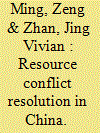

|
|
|
|
|
| Summary/Abstract |
Mineral resource extraction has frequently caused social tensions in China. This research examines the reactive and pre-emptive strategies used by the Chinese state to cope with resource conflicts. Based on extensive fieldwork in multiple mining areas, we find that the Chinese local state actively mediates between the mining sector and local citizens, and skilfully suppresses collective protests. More importantly, it pre-emptively intervenes in dispute-prone processes and redistributes resource wealth to create vested interests and mitigate popular grievances. We argue that the active state intervention in resource conflicts in China is driven by the party-state's tight control of local officials, which prevents local capture by resource interests, and enabled by the party-state's deep reach into society, which allows grassroots governments to negotiate between conflicting interests and mobilize resources towards conflict resolution.
|
|
|
|
|
|
|
|
|
|
|
|
|
|
|
|
| 9 |
ID:
153347
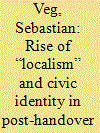

|
|
|
|
|
| Summary/Abstract |
While it was traditionally accepted that Hongkongers shared a form of pan-Chinese cultural identification that did not contradict their local distinctiveness, over the last decade Hong Kong has seen the rise of new types of local identity discourses. Most recently, “localists” have been a vocal presence. Hong Kong has – quite unexpectedly – developed a strong claim for self-determination. But how new is “localism” with respect to the more traditional “Hong Kong identity” that appeared in the 1970s? The present study takes a two-dimensional approach to study these discourses, examining not only their framework of identification (local versus pan-Chinese) but also their mode of identification (ethno-cultural versus civic). Using three case studies, the June Fourth vigil, the 2012 anti-National Education protest and the 2014 Umbrella movement, it distinguishes between groups advocating civic identification with the local community (Scholarism, HKFS) and others highlighting ethnic identification (Chin Wan). It argues that while local and national identification were traditionally not incompatible, the civic-based identification with a local democratic community, as advocated by most participants in recent movements, is becoming increasingly incompatible with the ethnic and cultural definition of the Chinese nation that is now being promoted by the Beijing government.
|
|
|
|
|
|
|
|
|
|
|
|
|
|
|
|
| 10 |
ID:
153350
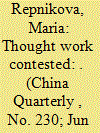

|
|
|
|
|
| Summary/Abstract |
This article examines the dynamic evolution of China's ideology work through the prism of journalism education. Official sensitivity about both student activism and the media makes journalism education a critical sector for observing how the Party attempts to instil ideology. The article interrogates the process of negotiation of official ideology among authorities, educators and students at elite journalism schools. It demonstrates that alongside state-sanctioned media commercialization and globalization, official influence still looms large in journalism training. Ideological teachings continue to occupy a core place in the curricula, and the authorities deploy a mix of structural oversight, ad hoc surveillance and coercion to keep the educators in check. The effects of the official ideology work, however, are ambivalent, as educators and students engage in the active reinterpretation of the Party's media principles. While these practices do not directly undermine the Party's legitimacy, they demonstrate that official ideology has merely constructed what Yurchak terms a “hegemony of form,” highlighting a degree of vulnerability in China's mode of adaptive authoritarianism.
|
|
|
|
|
|
|
|
|
|
|
|
|
|
|
|
| 11 |
ID:
153345


|
|
|
|
|
| Summary/Abstract |
How has social work, which has emerged as a distinct profession in the PRC with the full support of the party-state, come to produce neoliberal outcomes similar to those found in other, capitalist countries? In this article, I draw attention to the government purchase (goumai) of social work services, which is commonly considered as confirmation of state capacity and leadership rather than the passing on of state responsibilities to civil sectors with tight budgets. Ethnographic research on the actual social work practices in Shenzhen's Foxconn town reveals how neoliberal-style outsourcing has converged with diverse historical legacies, thus creating precarious labour conditions for frontline social workers. Neoliberal dynamics end up filling most of these social work positions with migrant youth from the countryside, reproducing and perpetuating China's rural–urban divide. Institutional efforts at social care may not only reduce the existing inequalities but may also rely upon and even reinforce them.
|
|
|
|
|
|
|
|
|
|
|
|
|
|
|
|
|
|
|
|
|